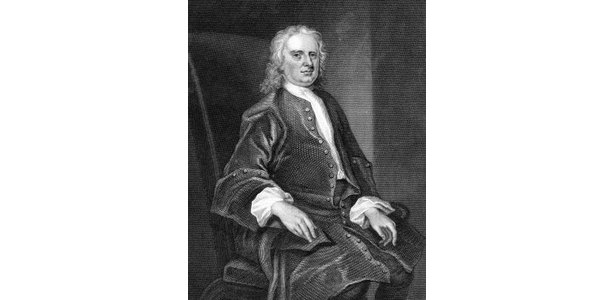Inertia Experiments
The Principle of Inertia states that every object persists in its state of rest or uniform motion in a straight line unless it is compelled to change that state by forces impressed on it. This law is evident throughout the observable world, from the smallest of pebbles to the most massive stars, and you can demonstrate it in a variety of ways.
Solids and Liquids
A hard boiled egg changes states from rest to motion more easily than a raw one.
Take two eggs, roughly the same size, and hard boil one of them. You have changed the properties of one egg by changing its interior mass from a liquid to a solid state. Now spin both eggs with roughly equal amounts of force. The boiled egg starts spinning more easily than the raw egg. While the eggs are spinning, quickly stop the boiled egg and remove your hand. The boiled egg will remain at rest. Do the same with the raw egg and it will resume spinning at a slower rate once you let go. The liquid within the raw egg remains in motion due to inertia near the egg's two ends, and the solid matter within the boiled egg does not.
Resistance to Horizontal Motion
- Resistance to horizontal motion is easily illustrated by a variation on an old parlor trick. When a magician pulls away a table cloth without disturbing the place settings, he relies on inertia rather than magic to accomplish his trick. For this experiment, balance a wooden hoop or ring atop an empty glass bottle. Balance a pen cap on top of the hoop so that the cap rests directly above the bottle's opening. Quickly pull the hoop away, allowing the cap to fall straight downward. If you are fast enough, the pen cap will drop into the bottle's open end. This demonstrates the cap's resistance to horizontal motion, or its persistence in a state of rest, before it is propelled toward the bottle by the outside force of gravity.
- Sponsored Links
- Medifast - Official Site Lose Up To 2-5 lbs Per Week Now! Medifast - Simple, Fast, Effective.http://www.googleadservices.com/pagead/aclk?sa=L&ai=By6Quq76RT_fwMKOKggKN2Z32DtKqxqYCiuupghv61PrDBZCaOxABGAEgqYmtBjgAUP-mkNX8_____wFgyYb_h_Cj7BKgAZD4w_4DsgEMd3d3LmVob3cuY29tyAEB2gE6aHR0cDovL3d3dy5laG93LmNvbS9pbmZvXzEyMDM1MDc2X2luZXJ0aWEtZXhwZXJpbWVudHMuaHRtbIACAcgCxqDDAagDAegDvAPoA0f1AwAEAIT1AwAAABCIBgE&num=1&cid=5Gh52InQkreoyaBksbcHm4v4&sig=AOD64_0aLEdY35aosn-Vp316qzVDfPzqgQ&client=ca-ehow_300x250&adurl=http://www.medifast1.com/index.jsp%3Fcampaign%3Dg000115
- Medifast - Official Site
A Body in Motion
- Just as a body at rest tends to remain so, a body in motion stays in motion without the interference of an outside force. You can illustrate this property of objects by trying to drop a tennis ball straight down while you run horizontally. As you pass a marked target on the ground, let the ball go directly over the target. Because your running with the ball places it in a state of motion relative to the ground, it remains in that state after you let it go. So, although you release the ball directly over the target, its path is determined both by gravity and its current state of motion, and it continues to move forward. Thus, it misses the target.
Inertia and Weight
- Hang a heavy weight from a thread and attach another thread below it, so that one thread supports the weight and the other hangs freely. Begin pulling on the free-hanging thread until one of the two threads breaks, and observe the results. If you pull slowly, you increase the force on the top thread by adding the force of your pull to the force of gravity acting on the weight, and the top thread will break. When you pull quickly, you pull against the weight's inertia and its tendency to remain in motion works against you, breaking the bottom thread instead.
Sponsored Links
- Acupuncture for Fertilityhttp://googleads.g.doubleclick.net/aclk?sa=L&ai=B3d5yq76RT_KFKIWDgAKP86GOD7369iLpjaWuA8CNtwGgl9MBEAEYASDj8ZsCKAQ4AFCc9-3W-v____8BYMmG_4fwo-wSsgEMd3d3LmVob3cuY29tugEKMzM2eDI4MF9qc8gBAdoBOmh0dHA6Ly93d3cuZWhvdy5jb20vaW5mb18xMjAzNTA3Nl9pbmVydGlhLWV4cGVyaW1lbnRzLmh0bWyoAwHoA7wD6ANH9QMABACE9QMAAAAQ&num=1&sig=AOD64_2Njy2lR0AlqoEwXSjn9V5ygXFzJQ&client=ca-ehow_336x280&adurl=http://www.harmonyhealth.us Chicago Infertility Specialists Natural or Support FSH/IVF/IUI
- Accelerate SFDC Adoptionhttp://googleads.g.doubleclick.net/aclk?sa=L&ai=BQPajq76RT_KFKIWDgAKP86GOD6WZ2pICxdaykTHAjbcB0Ma7AhACGAIg4_GbAigEOABQ5K-hyANgyYb_h_Cj7BKyAQx3d3cuZWhvdy5jb226AQozMzZ4MjgwX2pzyAEB2gE6aHR0cDovL3d3dy5laG93LmNvbS9pbmZvXzEyMDM1MDc2X2luZXJ0aWEtZXhwZXJpbWVudHMuaHRtbKgDAegDvAPoA0f1AwAEAIT1AwAAABA&num=2&sig=AOD64_3lqqYeZFVVe5HOideZHOwCq1zA7w&client=ca-ehow_336x280&adurl=http://go.ontuitive.com/USSFDCGoogle1_LP.html Whitepaper on Performance Support We believe in "learn by doing."
- Want Rapid Weight Loss?Thyroid-Weight-Loss.com Power-Boost Your Metabolism With A A Simple Thyroid Fix! Learn More.
- Best Diet SupplementActiveFactor.com Get a Best Diet Supplement Online Discount Savings For Active Living!
References
- Photo Credit Photos.com/Photos.com/Getty Images Ablestock.com/AbleStock.com/Getty Images Thinkstock/Comstock/Getty Images





